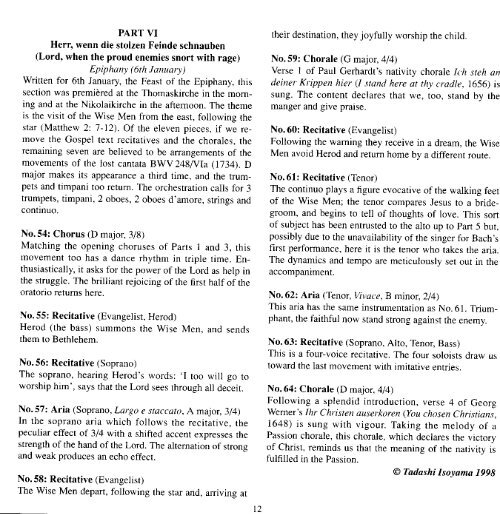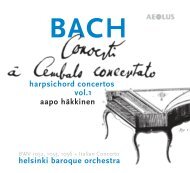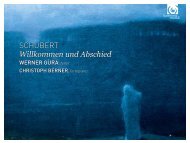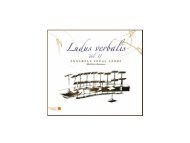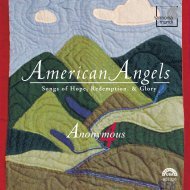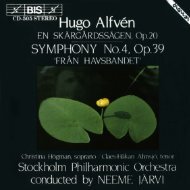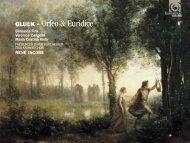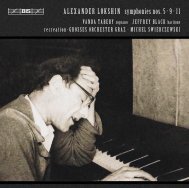Album_booklet - eClassical
Album_booklet - eClassical
Album_booklet - eClassical
Sie wollen auch ein ePaper? Erhöhen Sie die Reichweite Ihrer Titel.
YUMPU macht aus Druck-PDFs automatisch weboptimierte ePaper, die Google liebt.
PART VI<br />
Herr, wenn die stolzen Feinde schnauben<br />
(Lord, when the proud enemies snort with rage)<br />
E p i p hany ( 6r h.Iarwarl- )<br />
Written for 6th January, rhe Feast of rhe Epiphany, rhis<br />
section was premidred at the Thomaskirche in the moming<br />
and at the Nikolaikirche in rhe aftemoon. The theme<br />
is the visit of the Wise Men from the east, following the<br />
star (Matthew 2: 7-12). Of the eleven pieces. if we re-<br />
move the Gospel text recitatives and the chorales, the<br />
rcmarnlng seven are believed to be anangements of the<br />
movements of the lost canrata BWV 248/VIa ( 1734). D<br />
major makes its appearance a third time, and the trumpets<br />
and timpani roo return. The orchestration calls for 3<br />
trumpets. timpani,2 oboes,2 oboes d'amore, strings and<br />
continuo.<br />
No.5,l: Chorus (D major, 3/8)<br />
Matching the opening choruses of Parts I and 3, this<br />
movement too has a dance rhythm in triple time. En_<br />
thusiastically, it asks for the power of the Lord as help in<br />
the struggle. The brilliant rejoicing of the first half of rhe<br />
oratollo retums herc.<br />
No.55: R€citative (Evangelist. Herod)<br />
Herod (the bass) summons the Wise Men, and sends<br />
ihem to Bethlehem.<br />
No.56: Recitative (Soprano)<br />
The soprano, hearing Herod's words: 'I too will go to<br />
worship him', says rhat the Lord sees through all deceit.<br />
No.57; Aria (Soprano, Lar3o e stdccato, Amajo\ 311)<br />
In the soprano aria which follows the recitative, the<br />
peculiar effecr of 3/4 with a shifted accent exprcsses the<br />
strength of the hand of the Lord. The altemation of strong<br />
and weak produces an echo effect.<br />
No. 58: Recitative (Evangelist)<br />
The Wise Men depafi, following the star and, aniving at<br />
their destination, they joyfully worship the child.<br />
No.59; Chorale (G majo\414)<br />
Verse I of Paul Gerhardt's nativity chorale I(h steh an<br />
deiner Krippen hier (l stand here at tb, .radle.1656) is<br />
sung. The content declares that we. too, stand by the<br />
manBer and give praise.<br />
No. 60r Recitatiye (Evangelist)<br />
Following the waming they receive in a dream, the Wise<br />
Men avoid Herod and retum home by a different roure.<br />
No.61: Recitative (Tenor)<br />
The continuo plays a figure evocarive of the walking feet<br />
of the Wise Men: the tenor compares Jesus to a bridegroom,<br />
and begins to tell of thoughts of love. This sort<br />
of subject has been entrusted to the alto up to pan 5 but,<br />
possibly due to the unavailability of the singer for Bach,s<br />
first perfomance, here it is the tenor who takes the aria.<br />
The dynanics and tempo are meticulously set out in the<br />
accompmiment.<br />
No. 62: Aria (Tenor, Vivat e, B mlno\ 214)<br />
This ada has the same instrumentation as No.61. Triumphant,<br />
the faithful now stand strong against the enemy.<br />
No.63: Recitative (Soprano, Alto, Tenor Bass)<br />
This is a four-voice recitative. The four soloists draw us<br />
toward the last movement with imitative entries.<br />
No.64: Chorale (D major. ,l/4)<br />
Following a splendid introducrion, verse 4 of Georg<br />
Wemer's Ihr Chisten auserkoren (You chosen Christians,<br />
16.18) is sung with vigour. Taking the melody of a<br />
Passion chorale, this chomle, which declres the victory<br />
of Christ, reminds us thar the meaning of the narivity is<br />
fulfilled in the Passion.<br />
@ Tadashi Isoyama 1999


